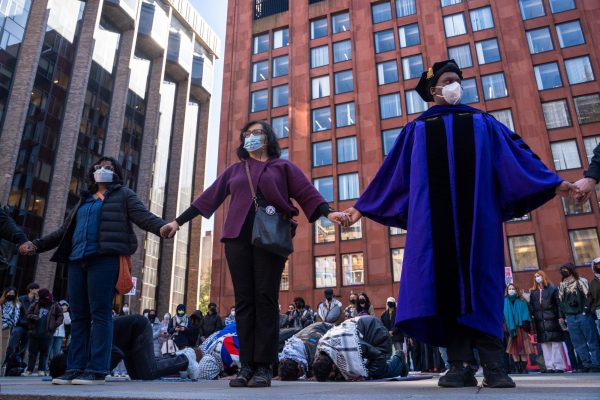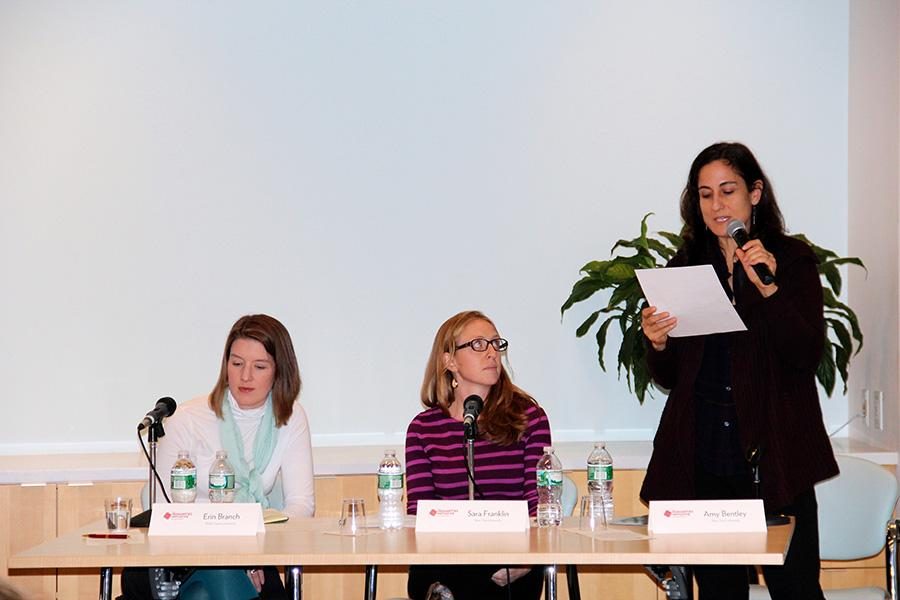Panel discusses gender, cooking in writing
Related stories
Amy Bentley speaks on Wednesday at a panel on women innovators in culinary history.
Panelists debated the role of women in the history of the culinary industry during a panel hosted by the NYU Humanities Initiative on Oct. 22.
Professor of nutrition, food studies and public health Amy Bentley moderated the discussion, “Women Innovators in Culinary History.” Also speaking at the panel were Tracey Deutsch, an associate professor at University of Minnesota, and Erin Branch, an assistant teaching professor at Wake Forest University.
Bentley opened the discussion with a question about the role that gender plays in culinary history and whether the panelists intended to address the issue in their work.
Megan Elias, director of the Center for Excellence in Teaching, Learning and Scholarship at the Borough of Manhattan Community College, spoke about her initial resistance to writing about gender and her later realization that it needed to be analyzed.
“I really did not want to write about gender because women and cooking are always tied together and I thought there’s something else going on here,” Elias said. “I just want to look at the words about food for their own sake and not what they have to tell us about women’s lives and women’s roles.”
Sarah Franklin, a food studies doctoral student in Steinhardt and panelists, however, said she embraced writing about women’s role in the culinary industry.
“I’ve been interested in women’s writing since many years ago, since I was a freshman in college,” Franklin said. “I was always interested in women’s writing and especially their descriptions of domestic spaces.”
The panelists also discussed the role of biographies in their research. Franklin said her research examines the life of Knopf senior editor Judith Jones and added that she does not believe lives can be looked at as linear.
“I found it very helpful to stop thinking about biography as something that looks like anything that runs from birth to death.” Jones said. “I think there’s a lot of interest in biography right now and one of the things that I find is very encouraging is it’s across disciplines.”
A member of the audience asked the panelists why culinary history is an important topic to discuss further, and why the content of cookbooks throughout history matters.
“This is something that people are dealing with everyday, constantly,” Branch said. “[Food] is ordinary in a lot of ways, it’s something that’s almost invisible. These documents that we can collect do tell us something about what people valued in terms of cooking and eating.”
Stern sophomore Vanessa Mao, who attended the event, said she did not realize how intertwined gender and cooking are.
“It’s interesting for my family,” Mao said. “My grandpa actually cooked for the whole family, not my grandma. I don’t see a specific role for women as a cook for the whole family. I feel like here, in general, people see food more as a lifestyle, and in China it’s more like a daily responsibility.”
A version of this article appeared in the Thursday, Oct. 23 print edition. Suebin Kim is a staff writer. Email him at [email protected].
















































































































































